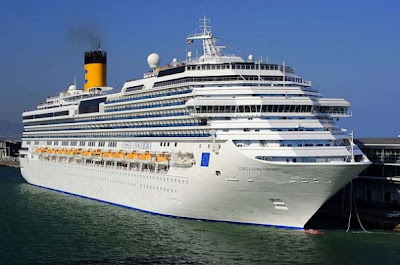 Washington, DC, USA (April 24, 2012) /BUSINESS WIRE/ — On behalf of the global cruise industry, Cruise Lines International Association (CLIA) and the European Cruise Council today announced that the cruise industry has adopted three new safety policies which are to be implemented with immediate effect. The announcement was made by Chairman of the European Cruise Council (ECC) and Member of the CLIA Executive Committee, Manfredi Lefebvre.
Washington, DC, USA (April 24, 2012) /BUSINESS WIRE/ — On behalf of the global cruise industry, Cruise Lines International Association (CLIA) and the European Cruise Council today announced that the cruise industry has adopted three new safety policies which are to be implemented with immediate effect. The announcement was made by Chairman of the European Cruise Council (ECC) and Member of the CLIA Executive Committee, Manfredi Lefebvre.
Speaking at a major European Commission-organized Passenger Ship Safety event in Brussels, he outlined how these policies have been agreed to by the industry and represent the third such announcement arising from the cruise industry’s Operational Safety Review.
These three new policies, which go beyond even the strictest of regulatory requirements, address issues related to passage planning, personnel access to the bridge and lifejackets. Each of these three policies will be reported to the United Nations’ International Maritime Organization (IMO) for consideration at their next session in May.
“As highlighted by these wide-ranging policies, we continue to take proactive measures to improve the safety of passengers and crew across the globe,” said Christine Duffy, president and CEO of CLIA. “We look forward to working collaboratively to identify any additional operational issues that will achieve our longstanding goal of continuous improvement and innovation in shipboard operations and safety.”
The three policies govern:
1) Passage Planning – Although cruise lines have followed IMO guidance on passage planning for many years, our policy now deems this to be a mandatory minimum requirement and enhanced by endorsement of the best practices contained in the International Chamber of Shipping’s Bridge Procedures Guide. Furthermore, under this policy each passage plan is to be thoroughly briefed to all bridge team members well in advance of its implementation and it is to be drafted by a designated officer and approved by the master.
2) Personnel Access To The Bridge – To minimize unnecessary disruptions and distractions on the bridge, we have adopted a policy that bridge access is to be limited to those with operational functions during any period of restricted manoeuvring or when increased vigilance is required.
3) Lifejackets – In addition to the statutory requirement of carriage of lifejackets for each person onboard, we have adopted a policy of carrying additional adult lifejackets onboard each cruise ship in excess of these legal requirements so that the number of additional adult lifejackets to be provided must not be less than the total number of persons berthed within the ship’s most populated main vertical fire zone. This ensures that the number of lifejackets carried is far in excess of the number of persons actually onboard the ship.
These policies were reviewed by CLIA’s recently-announced panel of outside maritime and safety experts who are evaluating suggested policy improvements as part of the association’s continuous efforts to review and improve safety measures by developing comprehensive best practices for industry-wide implementation and ultimately, formal submission to the International Maritime Organization, as appropriate.
Manfredi Lefebvre said: “Today’s European Commission event is in perfect alignment with our industry efforts to improve cruise ship safety. I am pleased to be given a chance by European Commissioner VP & Transport Commissioner Siim Kallas to outline how the industry and the regulators can move forward together in our common goal of preventing future accidents.”
He added: “The cruise industry is highly regulated and it is this regulatory regime, complied with onboard by our professional and committed officers and crews, that has given the cruise industry a truly remarkable safety record. But as the Concordia incident demonstrates, there is no such thing as perfect safety. We do strive for a perfect commitment to safety. And as part of our commitment to a safety culture, the industry – both individually as cruise lines and collectively through CLIA and the ECC – beginning January 27 launched an Operational Safety Review to learn the lessons from Concordia and to conduct a top to bottom safety review.”
He continued: “By bringing forward voluntary initiatives such as these, we significantly and immediately improve safety standards. These initiatives are, we believe, fully supportive of the Commission’s goal of re-launching their ‘Quality Shipping Campaign’ through voluntary partnership agreements with the shipping industry as set out in its Maritime Policy 2009-2018. Specifically, we very much hope that the results of the Operational Safety Review as they are delivered over the coming months will give us fertile ground to grow our partnership with the Commission”
He concluded: “We are convinced that this approach will achieve concrete, practical and significant safety dividends in the shortest possible time and fully reflects the measured and responsible progress on future safety initiatives by both the Commission and European Parliament following the Concordia tragedy.”
The new policies follow the industry’s announcement on January 27 of an Operational Safety Review in response to the Concordia incident and as part of the industry’s continuous efforts to review and improve safety measures, and represent the third such announcement. The previous two related to the new Muster Drill Policy (February 9, 2012) and Enhanced Reporting Requirements to Ensure Consistency, Transparency of Marine Casualty Data (March 21, 2012).
About CLIA
The nonprofit Cruise Lines International Association (CLIA) is the world’s largest cruise industry organization. CLIA represents the interests of 26 member lines and participates in the regulatory and policy development process while supporting measures that foster a safe, secure and healthy cruise ship environment. CLIA is also engaged in travel agent training, research, and marketing communications to promote the value and desirability of cruise vacations with thousands of travel agency and travel agent members across North America. For more information about CLIA, the cruise industry, and CLIA-member lines and travel agencies, visit www.cruising.org. CLIA can also be followed on the Cruise Lines International Association’s Facebook and Twitter fan pages.
About the European Cruise Council The European Cruise Council (ECC) represents the leading cruise companies operating in Europe and has 30 cruise members and 34 associate members. The ECC promotes the interests of cruise ship operators within Europe, liaising closely with the EU Institutions: the Commission, the Parliament, the Council of Ministers and their Permanent Representatives as well as with the European Maritime Safety Agency (EMSA). The ECC also looks to protect the interests of its Members through close liaison with other European bodies such as the European Community Shipowners Association (ECSA), the European Sea Ports Association (ESPO) and the European Travel Agents & Tour Operators Association (ECTAA).The ECC also promotes cruising to a wider public audience to encourage expansion of the European cruise market and works closely with a number of regional bodies such as Cruise Baltic, Cruise Europe, Cruise Norway and MedCruise. The European cruise industry continues to increase its share of the global cruise market with 25.2 million passengers visiting a European port in 2010; 5.2 million passengers joined their cruise in Europe in the same year with the industry generating €35.2 billion of goods and services and providing almost 300,000 jobs. In 2010 there were 198 cruise ships operating in Europe ranging in size from 3,600 passengers to less than 100. For more information please visit www.europeancruisecouncil.com





